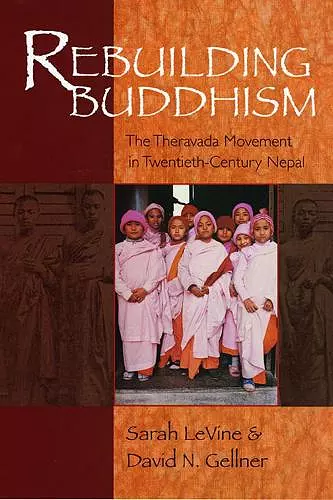Rebuilding Buddhism
The Theravada Movement in Twentieth-Century Nepal
David N Gellner author Sarah LeVine author
Format:Paperback
Publisher:Harvard University Press
Published:30th Oct '07
Currently unavailable, and unfortunately no date known when it will be back

This is a well-researched and carefully documented study of the modernization of Buddhist traditions in Nepal, one that is centered upon compelling biographies of Nepalese monks and nuns. Through following the arcs of these lives that are skillfully contextualized by the authors, one can discern the various crosscurrents at work in the religious field in Kathmandu throughout the twentieth century. The ethnography is rich and important for the fields of Nepalese studies, religious modernization, gender studies and Buddhist studies. -- Todd Lewis, College of the Holy Cross Accurate information about the Newar Buddhists of Nepal is difficult to come by. LeVine and Gellner's Rebuilding Buddhism makes an important contribution by allowing us to venture inside this multidimensional, yet fairly private, community. In this engaging work, we are introduced to fascinating individuals and to the compelling story of how religious traditions vie for territory and followers. It is therefore a welcome addition to the literature on Nepal and Buddhism. -- Jan Willis, Wesleyan University Lucidly and engagingly written, Rebuilding Buddhism is the first in-depth and sociologically sophisticated study of the Theravada revival in Nepal, whose Buddhism before the twentieth century was wholly Mahayanist. Its careful description and analysis of social, cultural, economic and above all gender dynamics make it required reading for anyone interested in Buddhism in the contemporary world, and recommended for anyone interested in comparative perspectives on modernity and gender. -- Steven Collins, University of Chicago
LeVine and Gellner describe in evocative detail the experiences and achievements of Nepalis who have adopted Theravada Buddhism. Based on extensive fieldwork, interviews, and historical reconstruction, the book provides a rich portrait of the different ways of being a Nepali Buddhist over the past seventy years.
Rebuilding Buddhism describes in evocative detail the experiences and achievements of Nepalis who have adopted Theravada Buddhism. This form of Buddhism was introduced into Nepal from Burma and Sri Lanka in the 1930s, and its adherents have struggled for recognition and acceptance ever since. With its focus on the austere figure of the monk and the biography of the historical Buddha, and more recently with its emphasis on individualizing meditation and on gender equality, Theravada Buddhism contrasts sharply with the highly ritualized Tantric Buddhism traditionally practiced in the Kathmandu Valley.
Based on extensive fieldwork, interviews, and historical reconstruction, the book provides a rich portrait of the different ways of being a Nepali Buddhist over the past seventy years. At the same time it explores the impact of the Theravada movement and what its gradual success has meant for Buddhism, for society, and for men and women in Nepal.
This is a well-researched and carefully documented study of the modernization of Buddhist traditions in Nepal, one that is centered upon compelling biographies of Nepalese monks and nuns. Through following the arcs of these lives that are skillfully contextualized by the authors, one can discern the various crosscurrents at work in the religious field in Kathmandu throughout the twentieth century. The ethnography is rich and important for the fields of Nepalese studies, religious modernization, gender studies and Buddhist studies. -- Todd Lewis, College of the Holy Cross
Accurate information about the Newar Buddhists of Nepal is difficult to come by. LeVine and Gellner's Rebuilding Buddhism makes an important contribution by allowing us to venture inside this multidimensional, yet fairly private, community. In this engaging work, we are introduced to fascinating individuals and to the compelling story of how religious traditions vie for territory and followers. It is therefore a welcome addition to the literature on Nepal and Buddhism. -- Jan Willis, Wesleyan University
Lucidly and engagingly written, Rebuilding Buddhism is the first in-depth and sociologically sophisticated study of the Theravada revival in Nepal, whose Buddhism before the twentieth century was wholly Mahayanist. Its careful description and analysis of social, cultural, economic and above all gender dynamics make it required reading for anyone interested in Buddhism in the contemporary world, and recommended for anyone interested in comparative perspectives on modernity and gender. -- Steven Collins, University of Chicago
[The authors’] careful research and thoughtful analysis focus on the perceptible life of this movement in society, rather than doctrines or ideas. As such, this study of the contrasts and occasional conflicts between the growing Theravada movement and the established tantric tradition reveals much about the dynamic life of Buddhism in a changing world. * Buddhadharma *
- Nominated for Victor Turner Prize in Ethnographic Writing 2006
- Nominated for Award for Excellence in the Study of Religion 2006
- Nominated for Ananda Kentish Coomaraswamy Book Prize 2007
ISBN: 9780674025547
Dimensions: unknown
Weight: unknown
394 pages